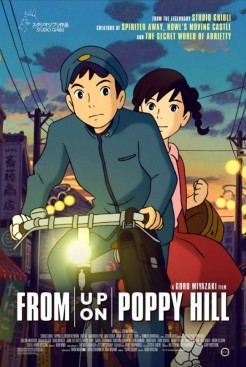
 From Up on Poppy Hill (IMDB) (Kokuriko-zaka Kara) is not the greatest movie that Studio Ghibli ever made. Still, even a second-rank Studio Ghibli film probably beats a first-rank film from any other animation studio. If you are an anime fan or just interested in Japanese culture you probably will want to see this, but it may leave the average American viewer cold. In any case it seems to be getting a fairly limited theatrical release, so if you want to see it in a theater you probably need to move fast.
From Up on Poppy Hill (IMDB) (Kokuriko-zaka Kara) is not the greatest movie that Studio Ghibli ever made. Still, even a second-rank Studio Ghibli film probably beats a first-rank film from any other animation studio. If you are an anime fan or just interested in Japanese culture you probably will want to see this, but it may leave the average American viewer cold. In any case it seems to be getting a fairly limited theatrical release, so if you want to see it in a theater you probably need to move fast.
The screenplay was co-written by Hayao Miyazaki and the movie was directed by his son Gorou. The story is set in 1963 and perhaps deliberately the animation has an old-fashioned look, more like Totoro than Arrietty. (Of course that means it looks like late-1980s anime, not like early-1960s anime which would be very crude by comparison.)
The story, based on a 1980 shoujo manga, is a low-key high school romance and coming-of-age story. Umi Matsuzaki helps run her grandmother’s boarding house located on top of “Poppy Hill.” Every morning she goes to the flagpole in the garden and runs up naval signal flags spelling out a message to her father, the captain of a supply ship that went down during the Korean War.
At her school some of the boys are trying to save a decrepit building called “The Latin Quarter” which serves as their clubhouse. A boy named Shun Kazama catches her eye with a dangerous stunt and she is gradually drawn into the campaign. It seems hopeless since Japan in 1963 is focused on modernization rather than preserving the past. She has the insight that the only chance to convince the adults to preserve the building is to make it more presentable.
It is interesting that the clubhouse is clearly boys-only. I get the impression that in 1963 Japanese high school girls either didn’t join clubs or at least didn’t join the same clubs that the boys joined. (There wouldn’t have been an explicit rule against it since the post-war constitution guaranteed legal gender equality, but there may still have been a strong social convention discouraging such fraternization.) If so the events shown in the movie may represent the beginnings of the coeducational extracurricular activities that play a central role in so many contemporary anime stories.
(It’s worth noting that even in contemporary anime, high school students almost always form single-sex groups at lunch and after school. The clubs are about the only place where one could get to know a person of the opposite sex, other than a childhood friend or a family member.)
This is the first Ghibli movie in a long time not to be released in America by Disney. GKIDS is doing the theatrical release which may explain why it is in a limited number of theaters.
The dub seems decent though it sounds stiff and awkward in some places. I think the problem is that it tries too hard to capture the multiple levels of politeness in Japanese. The resulting lines would probably be OK in subtitles but American voice actors have trouble saying them naturally. Classically trained British actors might do better. The language of Shakespeare comes closer to the spirit of modern Japanese than does modern American English.

